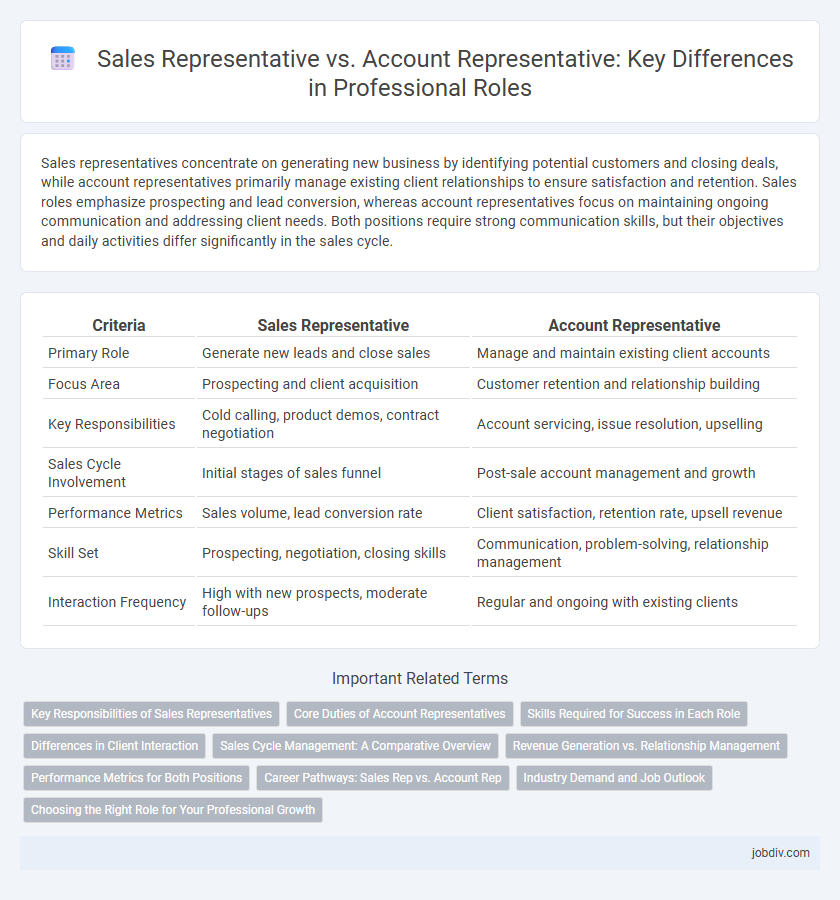Sales representatives concentrate on generating new business by identifying potential customers and closing deals, while account representatives primarily manage existing client relationships to ensure satisfaction and retention. Sales roles emphasize prospecting and lead conversion, whereas account representatives focus on maintaining ongoing communication and addressing client needs. Both positions require strong communication skills, but their objectives and daily activities differ significantly in the sales cycle.
Table of Comparison
| Criteria | Sales Representative | Account Representative |
|---|---|---|
| Primary Role | Generate new leads and close sales | Manage and maintain existing client accounts |
| Focus Area | Prospecting and client acquisition | Customer retention and relationship building |
| Key Responsibilities | Cold calling, product demos, contract negotiation | Account servicing, issue resolution, upselling |
| Sales Cycle Involvement | Initial stages of sales funnel | Post-sale account management and growth |
| Performance Metrics | Sales volume, lead conversion rate | Client satisfaction, retention rate, upsell revenue |
| Skill Set | Prospecting, negotiation, closing skills | Communication, problem-solving, relationship management |
| Interaction Frequency | High with new prospects, moderate follow-ups | Regular and ongoing with existing clients |
Key Responsibilities of Sales Representatives
Sales Representatives are primarily responsible for generating new business by identifying potential clients, presenting products or services, and closing sales deals to meet revenue targets. They conduct market research to understand customer needs and competitor offerings, enabling personalized sales approaches that enhance customer acquisition. Maintaining detailed records of sales activities and collaborating with marketing teams ensures alignment with organizational goals and effective client relationship management.
Core Duties of Account Representatives
Account Representatives primarily manage client relationships by maintaining ongoing communication, addressing customer inquiries, and ensuring satisfaction to foster long-term loyalty. They coordinate with internal teams to resolve issues promptly and customize solutions based on client needs, enhancing overall service delivery. Their core duties also include monitoring account performance metrics, preparing detailed reports, and identifying opportunities for upselling and cross-selling within existing accounts.
Skills Required for Success in Each Role
Sales representatives require strong persuasion skills, customer relationship management, and an ability to identify client needs to drive new business growth. Account representatives excel in client retention, detailed product knowledge, and advanced negotiation skills to maintain and expand existing accounts. Both roles demand effective communication, problem-solving abilities, and adaptability to dynamic market conditions.
Differences in Client Interaction
Sales Representatives initiate contact with potential clients to generate leads and close new business, emphasizing prospecting and relationship-building to expand the customer base. Account Representatives focus on maintaining and nurturing existing client relationships, addressing client needs, resolving issues, and ensuring ongoing satisfaction to promote repeat business and retention. The primary difference lies in Sales Representatives driving client acquisition, while Account Representatives concentrate on client retention and account growth.
Sales Cycle Management: A Comparative Overview
Sales representatives focus on initiating client relationships and driving new business opportunities throughout the sales cycle, emphasizing lead generation and closing deals. Account representatives manage ongoing client accounts, ensuring customer satisfaction, retention, and upselling within existing relationships during post-sale phases. Effective sales cycle management requires aligning these roles to optimize pipeline progression, from prospecting through account maintenance and growth.
Revenue Generation vs. Relationship Management
Sales Representatives primarily focus on revenue generation by identifying new business opportunities, pitching products, and closing deals to drive sales growth. Account Representatives concentrate on relationship management through maintaining ongoing client interactions, ensuring customer satisfaction, and managing contract renewals to foster long-term partnerships. Both roles are integral to a company's financial success, balancing immediate sales targets with sustained client engagement.
Performance Metrics for Both Positions
Sales representatives are typically evaluated on metrics such as total sales volume, conversion rates, and new customer acquisition, reflecting their focus on generating revenue and expanding the client base. Account representatives, however, are measured by client retention rates, customer satisfaction scores, and upselling success, emphasizing relationship management and long-term account growth. Both roles rely on key performance indicators like revenue growth and customer engagement, but the former prioritizes aggressive sales targets while the latter focuses on sustaining and enhancing existing client partnerships.
Career Pathways: Sales Rep vs. Account Rep
Sales Representatives primarily focus on generating new business by identifying prospects, presenting products, and closing deals, which builds foundational skills in customer acquisition and negotiation. Account Representatives manage ongoing client relationships, emphasizing customer retention, satisfaction, and upselling opportunities that develop expertise in account management and strategic communication. Career pathways diverge as Sales Reps often transition into business development or sales management roles, while Account Reps typically advance into client services leadership or strategic account management positions.
Industry Demand and Job Outlook
Sales Representative roles continue to experience robust demand across diverse industries such as technology, pharmaceuticals, and manufacturing, driven by the need for new client acquisition and revenue growth. Account Representatives are increasingly sought in sectors like financial services and advertising, where maintaining and expanding existing client relationships is critical for business stability. The job outlook for Sales Representatives shows higher growth rates in emerging markets, while Account Representatives benefit from steady demand due to client retention priorities.
Choosing the Right Role for Your Professional Growth
Choosing between a Sales Representative and an Account Representative role depends on your career goals and skill set; Sales Representatives focus on acquiring new clients and driving revenue through prospecting and closing deals, while Account Representatives emphasize maintaining and expanding relationships with existing customers. Prioritizing roles aligned with your strengths in negotiation or client management can accelerate professional growth and increase job satisfaction. Understanding industry-specific demands and company objectives helps optimize your contribution and long-term career trajectory.
Sales Representative vs Account Representative Infographic

 jobdiv.com
jobdiv.com